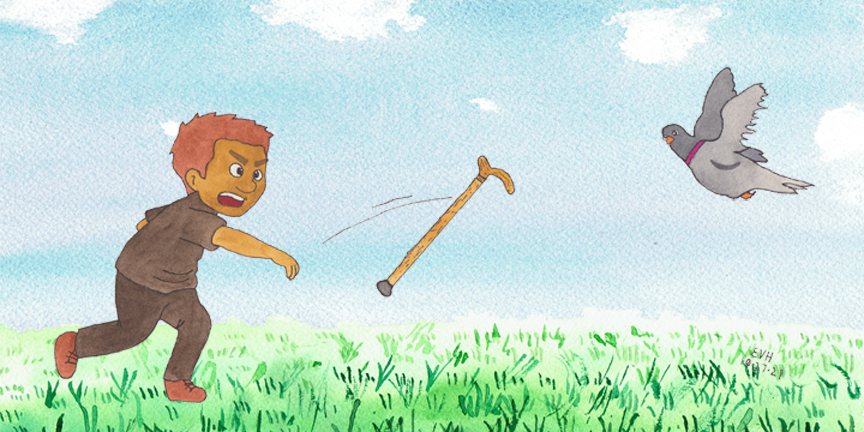
Jataka 277
Romaka Jātaka
The Sham Recluse
as told by Eric Van Horn
originally translated by William Henry Denham Rouse, Cambridge University
originally edited by Professor Edward Byles Cowell, Cambridge University
This story brings up an interesting phenomenon, and that is “sham” monks. This happens to this day in India. Men dress themselves up as monks in order to get alms and not have to work. Fortunately in this story our hero the Bodhisatta—not surprisingly—discovers his deceit.
“Here in the hills.” This story was told by the Master when he was at the Bamboo-grove (Veluvana… the first monastery). It is about attempted murder. The circumstances explain themselves.
Once upon a time, when Brahmadatta was the King of Benares, the Bodhisatta was reborn as a pigeon. He lived in a woodland in a cave in the hills and with a large flock of pigeons. There was a recluse, a virtuous man, who had built a hut for himself near a frontier village not far from the place where the pigeons were. He and the Bodhisatta visited from time to time, and he heard from him things worth hearing.
After living there for a long time, the recluse went away, and along came a sham recluse to live there. The Bodhisatta, attended by his flock of pigeons, visited him and greeted him respectfully. They spent the day hopping around the hermit’s abode, hut, picking up food in front of the cave, and returning home in the evening. The sham recluse lived there for more than fifty years.
One day the villagers gave him some pigeon meat that they had cooked. He was taken with the flavor and asked them what it was. “Pigeon,” they said. He thought to himself, “Flocks of pigeons come to my hermitage. I will kill some of them to eat.”
So he got rice and ghee, milk and cumin and pepper, and got them all ready. He hid a staff in a corner of his robe and sat down at the hut door waiting for the pigeons to come.
The Bodhisatta arrived with his flock, and he suspected that the sham recluse might be up to some wicked thing. “That wicked ascetic sitting there goes under false pretenses! Perhaps he has been feeding on some of our kind. I’ll find out!”
So he flew to the leeward side of the recluse and smelled him. “Yes,” he said, “the man wants to kill us and eat us. We must not go near him.” and off he flew with his flock.
On seeing that the Bodhisatta was keeping his distance, the hermit thought, “I will speak sweet words to him. I will become his friend, and then I will kill and eat him!” and he uttered the two first stanzas:
“Here in the hills, for one and fifty years,
O feathered fowl! the birds would visit me,
Nothing suspecting, knowing not of fears,
In sweet security!
“These very children of the eggs now seem
To fly suspicious to another hill.
Have they forgotten all their old esteem?
Are they the same birds still?”
Then the Bodhisatta stepped back and repeated the third stanza:
“We are no fools, and we know you,
We are the same, and you are too.
You have intent our lives to steal,
So, heretic, this fear we feel.”
“They have found me out!” thought the false recluse. He threw his staff at the bird but missed him. “Fly away!” he said. “I missed you!”

Figure: They have found me out!
“You have missed us,” the Bodhisatta said, “but you shall not miss the four hells! If you stay here, I’ll call the villagers and make them catch you for being a thief. Run off, quick!” In this way he threatened the man, and then he flew away. And the recluse could not live there any longer.
The Teacher—having ended this discourse—identified the birth: “At that time Devadatta was the recluse. The first recluse, the good one, was Sāriputta, and I was the chief of the pigeons.”
